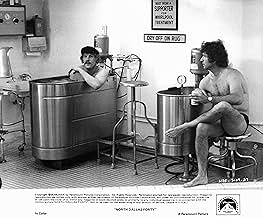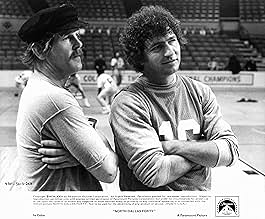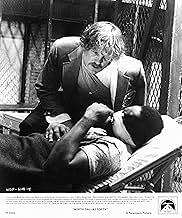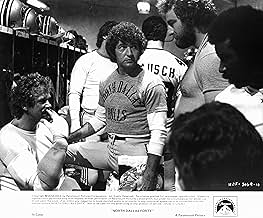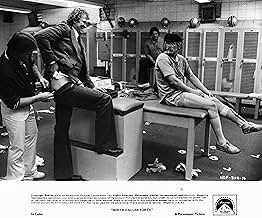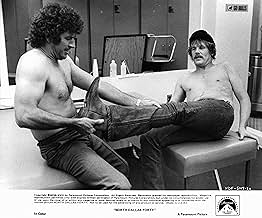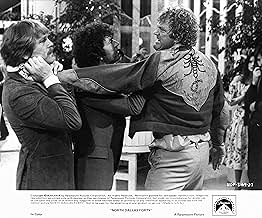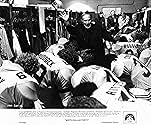IMDb RATING
6.9/10
6.3K
YOUR RATING
A satire of American professional football in which a veteran pass-catcher's individuality and refusal to become part of the team family are bitterly resented by his disciplinarian coaches.A satire of American professional football in which a veteran pass-catcher's individuality and refusal to become part of the team family are bitterly resented by his disciplinarian coaches.A satire of American professional football in which a veteran pass-catcher's individuality and refusal to become part of the team family are bitterly resented by his disciplinarian coaches.
- Awards
- 1 win & 2 nominations total
Savannah Smith Boucher
- Joanne Rodney
- (as Savannah Smith)
Alan Autry
- Balford
- (as Carlos Brown)
Featured reviews
When this movie first came out (late 70's), I was still in high school and very naive as to the behind the scenes machinations of professional football. This movie was ahead of its time in its depiction since no other movie on professional football had ventured into this area exposing drug use, both off the field casual usage and to get players on the field, and indifference of ownership and coaching staff to players feelings and thoughts.
Nick Nolte was exceptional as Phil Elliot, the wide receiver whose character was based on Pete Gent, a wide receiver with the Dallas Cowboys who authored the book (North Dallas Forty) the movie was based on. He is a free spirit with little regard for authority but undoubtedly cares about his performance on the field. He cannot play by the rules because he doesn't make them. Mac Davis was great as quarterback Seth Maxwell, the jaded athlete who knows how to "bend" the rules to remain in good standing with the team.
Supporting cast, especially GD Spradlin as the coach modeled after Dallas Cowboys coaching genius Tom Landry, was excellent. If you have 2 hrs and want to catch a well-acted, well-written movie on the reality of professional football, then catch this flick. It preceded such films and Stone's Any Given Sunday, but its content is very relevant to football 30 years later.
Nick Nolte was exceptional as Phil Elliot, the wide receiver whose character was based on Pete Gent, a wide receiver with the Dallas Cowboys who authored the book (North Dallas Forty) the movie was based on. He is a free spirit with little regard for authority but undoubtedly cares about his performance on the field. He cannot play by the rules because he doesn't make them. Mac Davis was great as quarterback Seth Maxwell, the jaded athlete who knows how to "bend" the rules to remain in good standing with the team.
Supporting cast, especially GD Spradlin as the coach modeled after Dallas Cowboys coaching genius Tom Landry, was excellent. If you have 2 hrs and want to catch a well-acted, well-written movie on the reality of professional football, then catch this flick. It preceded such films and Stone's Any Given Sunday, but its content is very relevant to football 30 years later.
The opening shot of Ted Kotcheff's North Dallas Forty is a tense and memorable one. It shows the aging and exhausted Phil Elliot (Nick Nolte), passed out in his bed and awoken by a blaring alarm clock. Elliot is slow to get up, every move being a slow one that clearly causes a searing amount of pain. He lumbers to the kitchen to get a beer before stumbling to soak in a bathtub. Punctuating this scene are brief little clips from last night's football game, where Elliot was met with several rough, polarizing blows to every part of his body. Interrupting this scene's quiet, almost meditative atmosphere are Elliot's loudmouth friends, clearly intoxicated, who want to go out and cause a ruckus with their shotguns.
What we see in the first few minutes of North Dallas Forty are what we never see in sports - the morning after the game. The physical pain rather than the heated press conferences or celebratory events in the locker. Because we see the lead character in such a vulnerable, often powerless light despite being a very good football player is why North Dallas Forty is so skilled on its feet as a film. It explores where other films would dim their focus. It fully embraces and boldly depicts in element where other screenwriters' knees would buckle under the weight and pressure of the story, especially for the time. Written by a trio of thoughtful and thoroughly ambitious people - Peter Gent, Kotcheff, and Frank Yablans - the film manages to be less entertaining and sensational, like a typical sports film, and more heartbreaking and an often immersing watch.
We set our sights on Elliot, who is becoming greatly dissatisfied with the way the NFL operates (his team is the fictional North Dallas Bulls, which mirror the Dallas Cowboys, FYI). He loathes the way managers and coaches treat their players like cattle, constantly emphasizing their flaws and not their advantages, and justifying their ungrateful, smug comments on poor performance as methods of tough-love. Elliot knows the organization is out to make money and injuries, long-term trauma, and player wellbeing are the least of their concerns. Through Elliot's dissatisfaction, however, he becomes heavily dependent on painkillers, alcohol, and other pills of sorts to keep his mind right. Just before a big game that determines the Bulls' playoff fate, Elliot's leg, which is experiencing hellish pain, is given a shot of a mysterious substance. What was it? What are its effects? Why is it being used? Who cares, "the whole thing's numb," Elliot states.
The film is held together not only by the competence of its writer but by Nolte's tremendous talents as a character actor and performing. He articulates with a touch of sensitivity and years of craft the agony and despair many aging athletes likely experience. For instance, consider Super Bowl XLVIII, which took place yesterday and ended with the Seattle Seahawks winning 43 - 8 over the two-point favorite Denver Broncos, led by Quarterback Peyton Manning, who is already thirty-seven years old with years of professional experience under his belt. I wouldn't want to feel what that man has felt waking up, especially now, nearing forty with the albatross of having numerous neck surgeries conducted. Watching the Super Bowl last night, I could only imagine how he not just him but many of those players wake up with severe pain in their bodies - pain that will likely carry over to their older years and maybe even cripple them as time goes on. All for a game that will be out of the immediate mindset of even the most heartened-fans in no more than two weeks or so.
On a final note, the promotional poster/home video release images for North Dallas Forty are criminally misleading ones, showing two football players, one dousing himself with water, the other hoisting his helmet while they both lounge in two cowboy boots with two woman grappling to get at them on both sides of the boots. The image at hand denotes a fun sort of rabble-rousing, Animal House-style entertainment which is completely absent from the film. This is not the film you will see, and the marketing campaign has shamefully misrepresented the film to consumers if their sole-exposure to the film is by looking at the film's promotional poster or home video cover.
Starring: Nick Nolte, Mac Davis, and Charles Durning. Directed by: Ted Kotcheff.
What we see in the first few minutes of North Dallas Forty are what we never see in sports - the morning after the game. The physical pain rather than the heated press conferences or celebratory events in the locker. Because we see the lead character in such a vulnerable, often powerless light despite being a very good football player is why North Dallas Forty is so skilled on its feet as a film. It explores where other films would dim their focus. It fully embraces and boldly depicts in element where other screenwriters' knees would buckle under the weight and pressure of the story, especially for the time. Written by a trio of thoughtful and thoroughly ambitious people - Peter Gent, Kotcheff, and Frank Yablans - the film manages to be less entertaining and sensational, like a typical sports film, and more heartbreaking and an often immersing watch.
We set our sights on Elliot, who is becoming greatly dissatisfied with the way the NFL operates (his team is the fictional North Dallas Bulls, which mirror the Dallas Cowboys, FYI). He loathes the way managers and coaches treat their players like cattle, constantly emphasizing their flaws and not their advantages, and justifying their ungrateful, smug comments on poor performance as methods of tough-love. Elliot knows the organization is out to make money and injuries, long-term trauma, and player wellbeing are the least of their concerns. Through Elliot's dissatisfaction, however, he becomes heavily dependent on painkillers, alcohol, and other pills of sorts to keep his mind right. Just before a big game that determines the Bulls' playoff fate, Elliot's leg, which is experiencing hellish pain, is given a shot of a mysterious substance. What was it? What are its effects? Why is it being used? Who cares, "the whole thing's numb," Elliot states.
The film is held together not only by the competence of its writer but by Nolte's tremendous talents as a character actor and performing. He articulates with a touch of sensitivity and years of craft the agony and despair many aging athletes likely experience. For instance, consider Super Bowl XLVIII, which took place yesterday and ended with the Seattle Seahawks winning 43 - 8 over the two-point favorite Denver Broncos, led by Quarterback Peyton Manning, who is already thirty-seven years old with years of professional experience under his belt. I wouldn't want to feel what that man has felt waking up, especially now, nearing forty with the albatross of having numerous neck surgeries conducted. Watching the Super Bowl last night, I could only imagine how he not just him but many of those players wake up with severe pain in their bodies - pain that will likely carry over to their older years and maybe even cripple them as time goes on. All for a game that will be out of the immediate mindset of even the most heartened-fans in no more than two weeks or so.
On a final note, the promotional poster/home video release images for North Dallas Forty are criminally misleading ones, showing two football players, one dousing himself with water, the other hoisting his helmet while they both lounge in two cowboy boots with two woman grappling to get at them on both sides of the boots. The image at hand denotes a fun sort of rabble-rousing, Animal House-style entertainment which is completely absent from the film. This is not the film you will see, and the marketing campaign has shamefully misrepresented the film to consumers if their sole-exposure to the film is by looking at the film's promotional poster or home video cover.
Starring: Nick Nolte, Mac Davis, and Charles Durning. Directed by: Ted Kotcheff.
I hadn't seen ND40 since it first opened, but I always remembered it as my favorite football movie. Since my friends are sick of me comparing every football movie to it, I decided to make sure I was still right after 20 years. The movie holds up remarkably over the years. Sure, lots has changed--making the movie a humorous period statement. The bad hair, the bad polyester clothes, and cigarettes everywhere. The coach actually has to tell the team to put out their cigarettes five minutes before the big game!
On substance, the movie is still right on the mark. The addiction to pain killers, the crippling effect of the game, and the effect the game has on the players personal lives all ring true today. Although we try to unsuccessfully bury some of those problems today, they sneak out anyway in Bret Favre's pain killers or OJ Simpson's arthritis.
One problem: if Nolte really is the best receiver on the team with the best hands in the league, why isn't he playing? I can hypothesize reasons, but the writer/director could have made the reasons more obvious.
9 stars out of 10
On substance, the movie is still right on the mark. The addiction to pain killers, the crippling effect of the game, and the effect the game has on the players personal lives all ring true today. Although we try to unsuccessfully bury some of those problems today, they sneak out anyway in Bret Favre's pain killers or OJ Simpson's arthritis.
One problem: if Nolte really is the best receiver on the team with the best hands in the league, why isn't he playing? I can hypothesize reasons, but the writer/director could have made the reasons more obvious.
9 stars out of 10
Phil Elliott (Nick Nolte) is a worn out wide receiver for the North Dallas Bulls professional football team in the 70s. It's crazy parties, drugs, sex, and alcohol. Seth Maxwell (Mac Davis) is the popular quarterback. Jo Bob Priddy (Bo Svenson) is a dumb wild lineman. Phil meets Charlotte Caulder (Dayle Haddon) at a party but she's not happy to be there. He rescues her from Jo Bob with a lot of help from Seth. Coach Strother thinks Phil isn't serious enough. Team executive Emmett Hunter (Dabney Coleman) is dating Joanne Rodney but Phil is actually sleeping with her. Johnson (Charles Durning) is the assistant coach. Phil is constantly threatened with the CFL. His body is all worn out and the trainer gives him 'B12' shots. Somebody mysterious is after him.
Based on the novel by Cowboys wide receiver Peter Gent, this has the feel of authenticity. It's not quite a spoof with few outright laughs. Nick Nolte is terrific as the weary player. The story is a bit scattered. It could be even darker and more intense.
Based on the novel by Cowboys wide receiver Peter Gent, this has the feel of authenticity. It's not quite a spoof with few outright laughs. Nick Nolte is terrific as the weary player. The story is a bit scattered. It could be even darker and more intense.
This post Hippie, late seventies, anti establishment film (the establishment in question being corporate sports) has a few problems but is mostly an enjoyable and at times powerful look at by far the most brutal of American athletic obsessions. It is especially good when employing locker room humor and disturbing, locker room detail to get at the pain and raunch that are at the center of football culture. Mac Davis' wonderfully scatological tale of the corruption of a religious QB is alone worth the price of admission. And the stuff involving needles, pills, and agonizing physical discomfort at times borders on the harrowing. As do the scenes on the football field, both in practice and actual games.
Where the film loses its edge, in my opinion, is when it gets up on its soapbox and pushes the very tired trope of the Evil Owners versus the Downtrodden Players. Not only were football players, even in the 1970s, paid way too much to be downtrodden but the speechifying from Nick Nolte and John Matuszak in the film's last third really slows down the action and takes what had been a fairly unpretentious movie into heavy, message laden waters. I also wearied of Nolte's character, modeled on Peter Gent upon whose novel the film is based. There is about him a general, unattractive air of elitism and superciliousness, especially evident at the orgy scene, where you can almost hear him bemoaning the fact that he, the reader of books and dater of intelligent brunettes, must suffer the company of these savages and their blonde bimbos. The character played by Mac Davis, by contrast, based on Don Meredith, is much more appealing in his combination of virtues (a wicked sense of humor and general perceptiveness about the folly of humanity) and flaws (a very elastic morality that easily embraces corruption). Indeed, if this Ted Kotcheff film had concentrated on the always uneasy Davis/Nolte friendship, instead of the evils of corporate sports, it might have had a chance at greatness. As it is, let's give it a B minus.
Where the film loses its edge, in my opinion, is when it gets up on its soapbox and pushes the very tired trope of the Evil Owners versus the Downtrodden Players. Not only were football players, even in the 1970s, paid way too much to be downtrodden but the speechifying from Nick Nolte and John Matuszak in the film's last third really slows down the action and takes what had been a fairly unpretentious movie into heavy, message laden waters. I also wearied of Nolte's character, modeled on Peter Gent upon whose novel the film is based. There is about him a general, unattractive air of elitism and superciliousness, especially evident at the orgy scene, where you can almost hear him bemoaning the fact that he, the reader of books and dater of intelligent brunettes, must suffer the company of these savages and their blonde bimbos. The character played by Mac Davis, by contrast, based on Don Meredith, is much more appealing in his combination of virtues (a wicked sense of humor and general perceptiveness about the folly of humanity) and flaws (a very elastic morality that easily embraces corruption). Indeed, if this Ted Kotcheff film had concentrated on the always uneasy Davis/Nolte friendship, instead of the evils of corporate sports, it might have had a chance at greatness. As it is, let's give it a B minus.
Did you know
- TriviaThis movie was made and released about six years after its source semi-autobiographical novel of the same name by Peter Gent was published in 1973. The name of the football team in the movie is the North Dallas Bulls, loosely based on the real-life NFL Dallas Cowboys, for whom Gent played between 1964 and 1968.
- GoofsWhen Phil is walking into Conrad Hunter's office building which is supposedly in Dallas, the Westin Bonaventure Hotel is plainly visible. This hotel is in Los Angeles and is an iconic building of five glass cylindrical towers.
- Quotes
O. W. Shaddock: Every time I call it a game, you call it a business, and every time I call it business, you call it a game.
- SoundtracksCuba
Performed by The Gibson Brothers
Written by Jean Kluger & Daniel Vangarde
courtesy of Island Records
- How long is North Dallas Forty?Powered by Alexa
Details
- Release date
- Country of origin
- Language
- Also known as
- North Dallas Forty
- Filming locations
- Los Angeles, California, USA(Conrad Hunter's Building)
- Production companies
- See more company credits at IMDbPro
Box office
- Gross US & Canada
- $26,079,312
- Gross worldwide
- $26,079,312
Contribute to this page
Suggest an edit or add missing content



